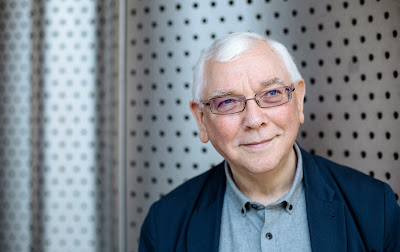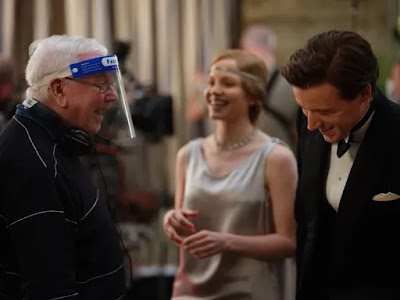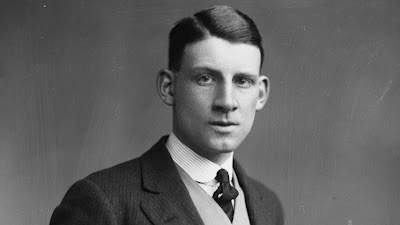 |
| Writer/director Terence Davies |
 |
| Davies on the set with Kate Phillips and Jack Lowden |
 |
| Siegfried Sassoon |
 |
| Sassoon with close friend Robert Hanmer |
 |
| shooting on the set |
BENEDICTION A- Great Britain USA (137 mi) 2021 ‘Scope d: Terence Davies
Alone he staggered on until he found Dawn’s ghost that filtered down a shafted stair To the dazed, muttering creatures underground Who hear the boom of shells in muffled sound. At last, with sweat and horror in his hair, He climbed through darkness to the twilight air, Unloading hell behind him step by step.
—excerpt from The Rear-Guard, by Siegfried Sassoon, written on the Hindenburg Line, April 1917, siegfried sassoon - The War Poems - Project Gutenberg
This has a towering, epic feel about it, something of a gay anthem, coming in the latter stages of the director’s career when history, vintage photographs, poetry, cinema, and Catholicism, which is painfully prominent, all merge together, incorporating his own queer history, telling the story of English poet, writer, and soldier Siegfried Sassoon (Jack Lowden), decorated for bravery on the Western Front, officer with the Royal Welch Fusiliers and winner of the Military Cross, becoming one of the most influential and historically important poets of the First World War. Angry at the futility of war, having lost his younger brother at Gallipoli, his compassionate anti-war poems differed from the jingoism and sentimentality of other war poets, more political and more edgy, instead writing about the horror and brutality of trench warfare and the tragic waste of human life, like ordering young men to charge against machine guns that literally mow them down, always remaining connected to those frontline soldiers while blisteringly satirizing the generals, politicians, and clergymen for their incompetence and blind support of the war. Public reaction was fierce, some complaining the poet displayed little patriotism, while others found his shockingly realistic depiction of war to be too extreme, accentuating the graphic detail, but he eloquently captured the feeling of trench warfare, where the accumulated war deaths in WWI were simply staggering, First World War: fatalities per country 1914-1918 - Statista, with soldiers dying by the millions, shown in a lyrical stream-of-consciousness montage of black and white photographs that are simply striking, set to the starkly unusual choice of music of (Ghost) Riders In The Sky - Vaughn Monroe (a #1 record) - YouTube (3:01), with WWI metaphorically supplanting the Wild West, quoting Wilfred Owen’s opening line “What passing-bells for these who die as cattle?” from Anthem for Doomed Youth, Anthem for Doomed Youth by Wilfred Owen | Poetry Foundation, or underlined by an impassioned reading of Sassoon’s poetry that reflects the weariness of British soldiers in a war that never seems to end. He wrote a letter to his commanding officer after throwing his Military Cross medal into the river, declining to return to duty because he believed the war was being deliberately prolonged by those who had the power to end it, A Soldier’s Declaration, Sassoon's Protest Statement, which was published in newspapers and read aloud in the House of Commons, causing an extreme degree of embarrassment for the British military and very nearly got him court-martialed, BENEDICTION (2022) movie clip: "I simply cannot remain silent..." YouTube (1:27), instead, after intervention from important figures, including British poet and historical novelist Robert Graves, his commanding officer in the Fusiliers, he was sent to the Craiglockhart War Hospital in Scotland for recuperation and treated for shell shock, a condition he did not have. It was there he met his treating psychiatrist, Dr. W. H. R. Rivers (Ben Daniels), the first in Britain to use “talking therapy,” discovering they both share a “love that dare not speak its name,” an Oscar Wilde reference to homosexuality, one of the first gay men he became close to, while also meeting fellow poet Wilfred Owen (Matthew Tennyson), who was the editor of The Hydra, a literary journal produced by the patients. Immediately striking up a friendship, they each shared a profound respect for each other’s enormous talent, each believing the other was the superior poet, providing a brief solace in their lives, developing a homoerotic friendship that was never consummated, seen dancing the tango together, cheek-to-cheek, but they kept in contact through correspondence, even as Owen was quickly sent back to the front lines, dying just a week before armistice was declared at the age of 25, with the war taking perhaps the only man he ever really loved. Owen’s work inspired Benjamin Britten to write his War Requiem, also Derek Jarman’s 1989 film by the same name, while his loss, added to Sassoon’s younger brother, and the collective loss of the millions of war dead affected him greatly, haunted by the cries of “the muffled dead,” losing so much at such an early age, never really coming to terms with the psychological damage of unfathomable trauma, all but confirming his worst fears.
Davies lyrically examined his own childhood in Distant Voices, Still Lives (1988) and The Long Day Closes (1992), created a passionate ode to his hometown, Of Time and the City (2008), explored the literary passages of Edith Wharton in THE HOUSE OF MIRTH (2000), Terence Rattigan in The Deep Blue Sea (2012), Lewis Grassic Gibbon in 2016 Top Ten List #7 Sunset Song, and American poet Emily Dickinson in A Quiet Passion (2017), and while this fails to meet the poetic depth of his earlier films, the dramatization still feels like an elegiac transformation onto the screen, creating haunting moments that simply linger in the air, including beautifully constructed sequences shot by Nicola Daley, working with the director for the first time, that eloquently express Davies as a superb conceptual artist. Bringing a theatrical quality to the production, with Sassoon returning home after the war, Christmas is laced with an anguished memory of all that has just transpired, leaving one exhausted and emotionally spent, Benediction Movie Clip - Reliving the Past (2022) | Movieclips Coming Soon YouTube (1:19), while also searching for the sublime in a portrait of cherry blossoms set to exquisitely delicate music, Butterworth: A Shropshire Lad - Loveliest of trees - YouTube (3:27). Brilliantly written by Davies, in tune with the sensitivity of each character, the wit and elocution of the dialogue is among the director’s best, each word precisely chosen, initially established through the tender exchanges between doctor and patient, both proper English gentlemen, developing an immediate rapport through their erudite language, but growing more intellectually testy as he enters the upper echelons of British society after the war, developing an Oscar Wilde flair for the dramatic in a series of romantic affairs and encounters with rich socialites, reciting one of his own poems, Benediction: Blaze Of Lights (HD CLIP) Jack Lowden, Tom Blyth WWI Movie YouTube (1:41), while indulging in parties and extravaganzas in the Gatsby-like era of the Bright Young Things of the 1920s - Historic UK where gay and lesbian relationships were commonly accepted. In this richly decadent atmosphere he meets Ivor Novello (Jeremy Irvine), a matinee idol, composer of witty stage music, and openly gay silent screen star in Hitchock’s atmospheric murder mystery drenched in fog, The Lodger (1927), who sings his own deliciously witty novelty song, And Her Mother Came Too (Harold Lloyd) - YouTube (1:53), before scandalously ditching his boyfriend and taking the arm of Sassoon to commence yet another romantic fling. This same song was sung by Jeremy Northam when playing Novello in Robert Altman's Gosford Park (2001), aptly reflecting the times in which it was written, when risqué tongue-in-cheek comedy was all the rage. The screen is a bouquet of gay narcissists flaunting their flamboyant effeminance, literally snarling at one another with their claws out, including actor and theater director Glen Byam Shaw (Tom Blyth), coupled with Novello before Sassoon came onto the scene, and Stephen Tennant (Calam Lynch), an impetuous and beguiling prize with a flair for the rich and glamorous, something of a social climber habitually looking at himself in the mirror while continually exhibiting an insouciant flair. All handsome and divinely dressed, at times this resembles a chic costume drama where the winner takes the prize, like when they meet Hester Gatty (Kate Phillips), the well-connected and wealthy daughter of a Chief Justice who dabbled in painting and writing poetry, quickly grabbing Sassoon when the occasion suits her, BENEDICTION - Frist Clip For Terence Davies’ Siegfried Sassoon Biopic Starring Jack Lowden #TIFF2021 YouTube (2:16). Described by Sassoon’s mother as the “pretty boys,” they all interchange with one another in relationships at some point in time, trying one another out like some kind of social experiment, where the freedom they are looking for resembles the free love movement from the 60’s, while hovering over them is art critic Robbie Ross (Simon Russell Beale), an elder gay statesman who bravely defended Oscar Wilde (who was imprisoned for his sexuality) from scurrilous attacks and helped protect his literary legacy. Left out of the film is the affair Sassoon had with Prince Philipp of Hesse, a German aristocrat who later joined the Nazi Party, serving as Hitler’s art collector. The fleetingness of these Bohème relationships mirror the cattiness of the characters and the ferocity of the sharp barbs intended to stab their prey, exhibiting a stifling self-centerdness of people utterly caught up in themselves, where you wonder why anyone would stick around, Benediction: The Fight (HD CLIP) Jack Lowden, Tom Blyth WWI Movie YouTube (2:19), but it reflects the underlying anxiety of being gay during a time when it was outlawed, something that has also plagued the director throughout his life, scurrying to the hallowed realms of the Catholic Church in hopes of salvation, only to end up bitterly disappointed.
Rather than telling Sassoon’s story in a biographical sense, Davies approaches his life subjectively, accentuating the accompanying feelings expressed through his poems, where his films are often memory plays, using associative editing and an evocative use of music, offering reflections of looking back at one’s life with a sense of regret. The length of the film feels rightly deserved in this film, as poetry needs space to breathe, where the silences and pauses need to be felt. By scouring Sassoon’s diaries, the actor Jack Lowden quickly realized he was playing a conglomeration of Sassoon mixed with the director’s own personal feelings, merging into a starkly authoritative depiction of growing up gay in the moral straightjacket of the British empire (homosexuality was outlawed until 1967, with a new law passed just weeks after Sassoon’s death), leading to a tortuously repressed existence. This is the director’s most openly gay film, though he maintains the self-loathing factor associated with his own homosexuality ('Being gay has ruined my life' – The Irish Times), while the reverence Sassoon feels for the community of brothers lost in the war has a nearly homoerotic connotation, as they represent the hopes and dreams of a future generation that never see the light of day, expressing so much love and admiration for them, as they carried with them his own aspirations for a better world and a better life. When they died, something within him died as well. While there is frivolity in youth, with economic privilege granting them sexual freedoms, Sassoon’s life evolves into unusual sadness, hiding behind an angry veneer of an almost sneering honesty, though his mother (Geraldine James) reminds him “it’s more humane to be kind than honest.” Filled with a gravity of emotions that suggests an endlessly combustible inner turmoil, Sassoon is driven back into the closet where he leads an overly repressed shadow life, searching for redemption through societal respectability and the protected sanctity of marriage, and ultimately religion, never really enunciating his disappointment, instead hoping for the sought-after salvation. Thinking this may come in the form of Hester Gatty, at age 47 Sassoon marries her, twenty years younger than him, hoping to have a child together, then somewhat later he converts to Catholicism, where the great promise of a more stabilized life turns into an unmitigated disaster. One of the most startling images is an age transformation in a held shot, as Jack Lowden morphs into a much older Peter Capaldi, thoroughly embittered and dejected at the abysmal state of his life, supremely angry at the world and disgusted with himself, living in a sterile relationship with an unhappily discouraged partner, where the alluring Kate Phillips transforms into a frumpy Gemma Jones, losing all sense of her former sensuality, looking positively dour, neither one having anything to say to each other, with Gatty eventually departing for Scotland, driven to unending despair by a relentless onslaught of verbal abuse from an uncaring husband. Yet for abject cruelty, it would be hard to top a scene with the now older Stephen Tennant (Anton Lesser), as it appears there are simply no feelings left, Benediction (2022) Clip | Jack Lowden, Peter Capaldi YouTube (1:30). Their grown-up son George (Richard Goulding) looks nothing like either one of them, blending into the landscape with a thoroughly average appearance, where nothing about him stands out, apparently playing referee between his two parents, acting as a go-between until they separate, trying to get his father to utter anything, as he goes into catatonic states of aloof despondency, sitting for hours without saying a word. When he finally gets his father to go to the theater, thinking this would have a positive effect on his outlook, they go to the overly cheery Anthony Newley British comedy Stop the World – I Want to Get Off, a show that ends with the song What Kind of Fool Am I?, yet what Davies chooses to show is the cheesy sentiment of Typically English (Live) - YouTube (3:42), which Sassoon must have found dreadful. The film opens with Sassoon’s A Soldier’s Declaration and closes with Wilfred Owen’s poem Disabled, Disabled by Wilfred Owen | Poetry Foundation, which is read while a young Sassoon sits on a bench and witnesses a legless war veteran in a wheelchair being taken outside a medical facility and simply forgotten, leaving him drowning in an abject state of horror, where the title takes on an elegiac significance, merging into a final wordless sequence that is as bleak as it is enthralling, endlessly holding onto a face, where you may recall a similar heart-wrenching finale, Visions of Gideon- Sufjan Stevens (Call Me By Your Name Soundtrack) High Quality YouTube (4:42), though this shakes the very core of one’s being, set to a Vaughan Williams theme, Fantasia on a Theme by Thomas Tallis - YouTube (16:35), where Sassoon has simply lost all faith in the world, leaving him heartbroken and dismally sad, seemingly frozen in time, transformed into an agonizing state of morose despair.

























































